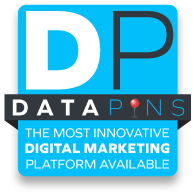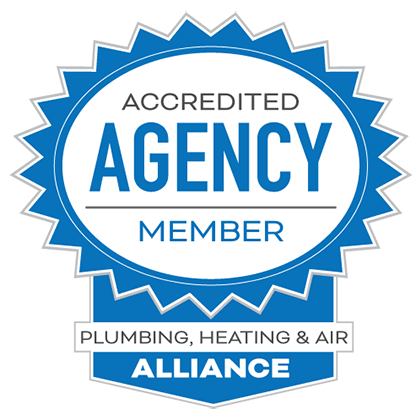Email marketing for plumbers produces an average ROI of $40 for every dollar spent and an impressive return compared to other plumbing marketing strategies.
With careful segmentation, consistent scheduling, and regular testing, any plumber can craft a sophisticated (and productive) email campaign.
Considering how easy and cheap the marketing channel is, it’s a wonder that more businesses haven’t tried to enhance their plumbing marketing campaign through email.
Below, Plumbing Webmasters explores eleven easy ideas to power up your email marketing campaigns for more substantial lead generation.
If you’ve struggled to get your email list off the ground, these tips will help you a bunch.
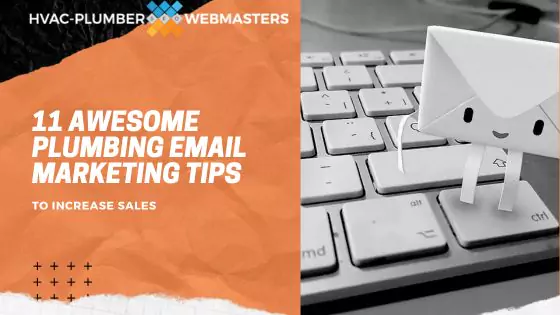
Setting Plumbing Email Marketing Goals
Many plumbers neglect their email marketing campaigns because they lack defined goals and a vision for how they will contribute to their broader marketing strategy.
Below, we’ll outline how you can set goals related to your email marketing process:
Marketing Integration
Successful email campaigns align with broader marketing objectives such as lead generation, brand building, and website traffic.
At Plumbing Webmasters, we stress the importance of building a digital brand through multiple digital assets, including a website, Google Business Profile, and social media accounts.
Integrating your email marketing campaign with your other assets helps foster digital brand signals that strengthen every aspect of your marketing effort.
SMART Goals
We recommend defining your email marketing goals within the SMART goal parameters. SMART goals are specific, measurable, attainable, relevant, and time-sensitive.
Examples of SMART goals for email marketing are:
- Increase open rates by 20% in 90 days
- Increase website traffic by 30% in 180 days
- Increase qualified weekly leads by 15% in 300 days
Each plumbing company’s goals will differ based on its budget, resources, and location, but every business can set objectives using the SMART parameters.
Develop a Plumbing Marketing Strategy with Email Campaigns
Plumbing email marketing works best as part of a broader campaign that includes SEO, Google Business Profile optimization, DataPins, and brand building.
The goal is to generate consistent plumbing leads for your local business without relying on paid advertising channels such as Google Ads or Facebook Ads or buying third-party leads.
Email marketing is one part of this equation but should not be used as a standalone marketing strategy. Consumers are less likely to trust emails from brands they don’t recognize.
When your brand is visible on organic search results and has accumulated positive reviews, people are likelier to open and engage with your emails.
Email Marketing Tips for Plumbers
Industry statistics showcase the upside of plumber email marketing when used in the proper context.
However, subpar email marketing campaigns can lower brand favorability and make homeowners unsubscribe or mark your emails as spam.
To achieve the best-case scenario and avoid the worst, follow these email marketing tips for plumbers:
1) Focus on Ideal Customers
Aimlessly blasting emails to a massive subscriber list is the fastest way to earn a negative reputation with your users.
To maximize open rates and increase deliverability, only send specific email campaigns to your ideal customers (for that campaign).
Some studies have shown that this practice, called audience segmenting, increases click-through rates by up to 100%.
Segmented email campaigns reduce the number of emails sent in a single campaign and lower bounce rates, mitigating the risk of being marked as spam.
Examples of segmented customers would include:
- Repeat Customers: Subscribers who’ve used your plumbing services multiple times are the most responsive to using them again.
- First-time Homeowners: Subscribers who are first-time homeowners typically constitute specific types of plumbing services at particular points in the home ownership.
- New Subscribers: New email subscribers are likely seeking more information about your company, including customer reviews and testimonials.
The more information you gather about your customers through a plumbing CRM, the more detailed you can segment them into your email list.
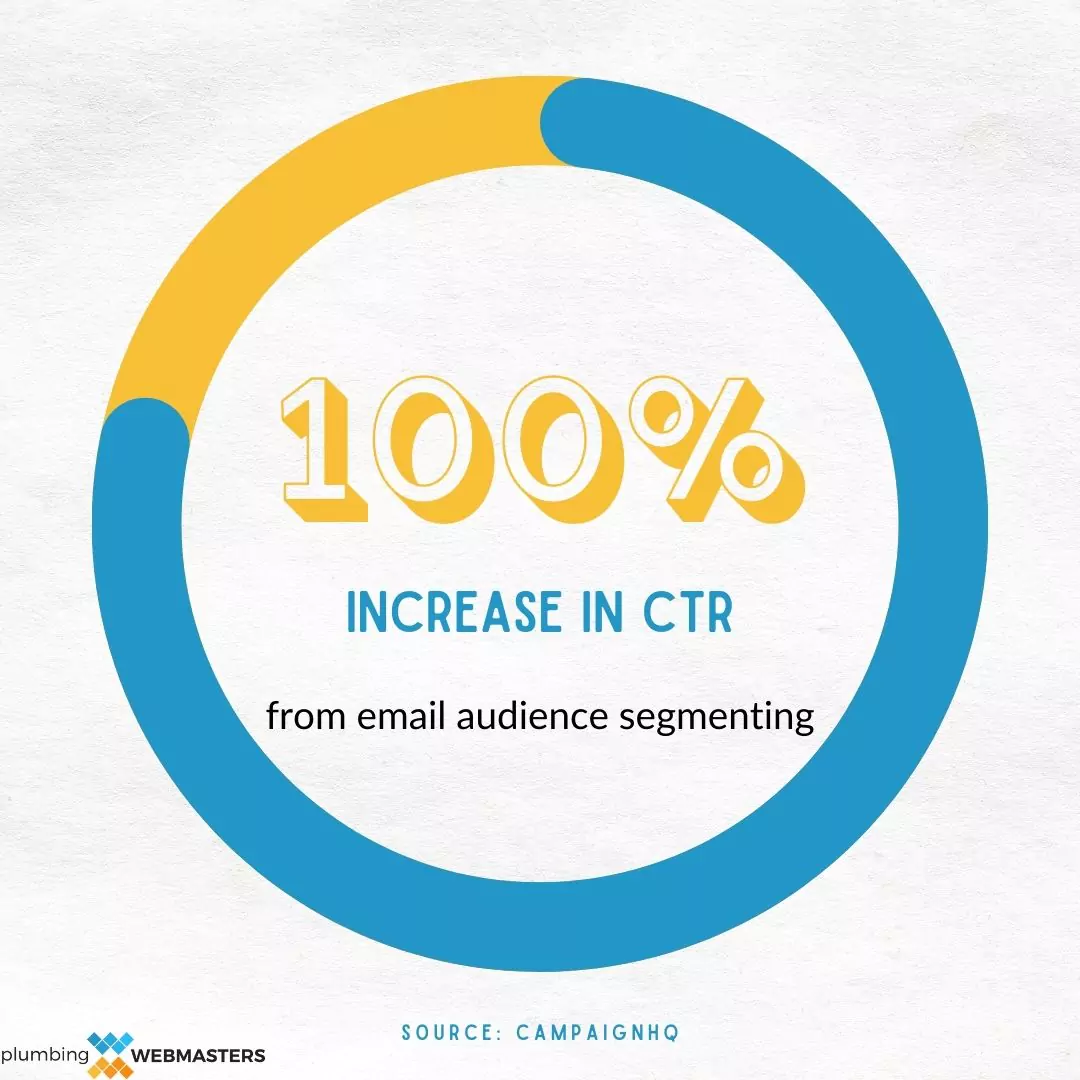
2) Optimize Subject Lines to Improve Open Rates
Homeowners receive over 100 daily emails from businesses, which means your subject line must stand out to earn an open.
The easiest way to optimize your subject line is to personalize it with a short code like (subscriber_name), automatically inserting the recipient’s name into the subject line.
While personalization is a good start, you need more to compel users to open your email. That’s why inserting emojis into your subject line is another way to draw engagement.
Even with emojis and personalization, your subject line must still showcase clear value for users to consider opening it.
You can expand on this value proposition in your preview text, which generally ranges from 50 to 80 characters.
3) Craft User-Friendly Email Copy and Formatting
After earning the open with a compelling subject line, the next step is to keep users engaged with your email.
To achieve this, you need easy-to-read content with user-friendly formatting. As consumers’ attention spans grow shorter, so does their tolerance for long, cumbersome emails.
Emails should be brief and concise and revolve around a single call-to-action (CTA), which has been shown to increase click-through rates by more than 370%.
Like your subject line, your email copy should also address the subscriber by first name to personalize the message.
If you’ve correctly segmented your list, this combination of copywriting tactics should drive high conversion rates.
4) Ensure Consistent Branding
Email users are pre-positioned to open, engage, and convert when they trust the brand sending the email.
The numbers back this up, with 90% of consumers admitting to buying from trustworthy brands.
Building that trust requires a multi-channel branding effort that includes Facebook, Instagram, YouTube, Google Business Profile, and more.
Brand consistency relies on your company name, logo, color scheme, and website URL, which should not change (even slightly) across platforms.
Consistent branding will increase your open rates and conversions and strengthen other parts of your digital marketing strategy, especially your SEO rankings.
5) Clean Your Email List to Increase Delivery Rates
Plumbers who want to maximize delivery rates must commit to a clean and lean email list with engaged subscribers.
Cleaning email lists starts with removing disengaged subscribers and merging duplicates, both of which should be done at least once per month.
Studies show that over 15% of emails are undeliverable, which wastes the senders’ resources.
Cleaning your lists can improve your deliverability rate while saving resources and increasing engagement rates.
These measures combine to keep you out of spam folders and into your consumers’ inboxes.
6) Create a Mobile-First Email Experience
Just as modern visitors access plumbing websites through mobile devices like smartphones, the same can be said about emails.
Whether consumers use the Gmail app, Apple’s Mail app, or another mobile email application, they will read your promotional emails on their phones or tablets.
That’s why a mobile-first email experience with shorter subject lines (30 characters maximum) will perform best in 2025.
Concise emails perform better across all devices (who wants to read a novel about plumbing services?), but this is particularly true for mobile users.
In addition, ensure your CTA is mobile-optimized and easily clickable from a smartphone.
7) Utilize Email Campaign Automation
Email automation can streamline your professional strategy, saving time that would otherwise be spent running other aspects of your business.
By using an email marketing campaign automation, plumbers can:
- Automatically send hundreds of emails in one click
- Send emails a defined time of day or the day of the week
- Send personalized emails based on the subscriber’s form information
- Alter the subscriber’s following email based on their response
Doing this legwork upfront can turn your email marketing campaigns into a well-oiled machine that takes every new subscriber through a customized journey that results in consistent sales.
In addition to automatically engaging with new prospects, email automation can also be used to reactivate dormant subscribers or those who fell out of the sales funnel at some point.
8) Use Email to Request Reviews
One of the most overlooked use cases for plumber email marketing is generating reviews and testimonials.
Google Reviews are an SEO ranking factor for plumbers, and reviews across all credible platforms (Facebook, Yelp, Angi’ BBB, etc.) contribute to branding and conversion rates.
That’s why plumbing companies should utilize email marketing for review requests if nothing else.
Plumbers can use a tool like DataPins, which includes an email review request feature that helps increase your Google reviews.
9) Insert Customer Testimonial Videos into Emails
Your longest-tenured customers may be willing to record a video testimonial for your plumbing business.
If you can secure these videos, ask the client if you can include these in your marketing materials, including emails.
By including video testimonials within your emails, you can increase engagement by 200%.
If you cannot get video testimonials, include text-based reviews from credible platforms like Google and Yelp, which also help with conversions.
Prospects are influenced by the experience of other customers they can relate to.
10) Abide by a Consistent Schedule
Most people check their emails between 9 AM and 2 PM, increasing open rates during this timeframe.
As a local plumbing company, all or most of your subscribers will be in the same timezone, which makes it easier to schedule emails within this window.
Determine how many emails you will send per week or month to specific lists (the number may vary by list segment) and set a time between 9 AM and 2 PM.
Don’t alter this schedule unless your performance analytics give you a reason to improve CTR or open rates.
By and large, customers value consistency with email scheduling.
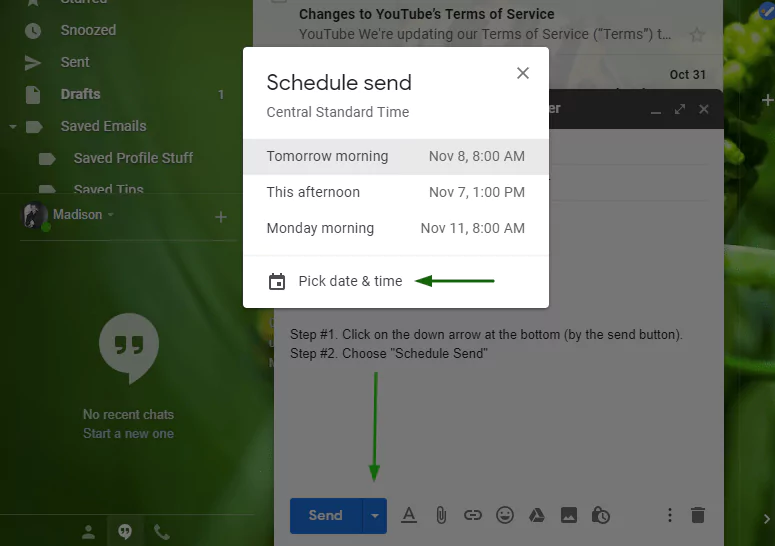
11) Measure Email Campaign Performance
Email marketing software tools like Aweber and Mailchimp include analytics tracking, which measures your campaign performance.
This is a critical component of email marketing, as monitoring the effectiveness of various emails and campaigns is crucial to improving your messaging over time.
It’s critical to evaluate the following metrics:
- Open Rate
- Click-through Rate
- Conversion Rate
- Bounce Rate
If your numbers are lower than expected or drop suddenly, it’s time to improve some aspects of your email marketing process.
Just as you use Google Analytics and Google Search Console to measure website performance, you can use these metrics to measure your email campaign’s effectiveness.

source: aweber.com
Elevate Your Plumbing Email Marketing
Plumbing email marketing is essential to an effective digital marketing strategy in 2025.
Email campaigns have been shown to produce higher ROI than several other forms of business promotions, particularly PPC ads.
Still, it’s crucial to view email marketing within a broader marketing strategy that includes a multi-channel approach of SEO, DataPins, social media marketing, Google Business Profile optimization, and digital brand building.
Investing in plumbing marketing on each channel will increase your email open, engagement, and conversion rates.
Still, it’s essential to familiarize yourself with email marketing techniques that lead to better performance, such as setting SMART goals, optimizing subject lines, and maintaining brand consistency.
While favorable open rates are attainable, they are not guaranteed, especially given the number of business emails consumers receive daily.
Standing out in your prospect’s inbox requires a strategic approach that aligns with your plumbing brand.
When adequately executed, email marketing for plumbers can produce a substantial ROI.

